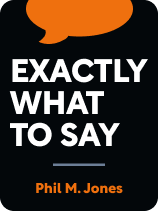

This article is an excerpt from the Shortform book guide to "Exactly What to Say" by Phil M. Jones. Shortform has the world's best summaries and analyses of books you should be reading.
Like this article? Sign up for a free trial here.
Want some tips for closing the deal in sales? How can you best handle a “yes” or “no” response from your client?
In Exactly What to Say, business expert Phil M. Jones describes how to improve your business interactions by using key phrases that appeal to your listener’s subconscious mind. He offers tips for closing the deal in sales, telling you what to say to capitalize on a “no” or “yes.”
Read on to learn Jones’s advice for closing the deal in sales, regardless of the customer’s ultimate response.
Closing the Deal in Sales
Phil M. Jones is an author and business expert who wrote Exactly What to Say to explain how using his key phrases helps you appeal to the customer’s subconscious mind, gain the upper hand in conversations, and increase your chances of making a sale when it’s time to close the deal. Jones’s advice is geared toward business interactions, but he notes that the principles are transferable across many industries and contexts. In this article, we’ll explain Jones’s advice for closing the deal in sales so that you can end on a strong note after the customer makes a decision. These key phrases help you get a downsell if a prospective customer says no and help you get a referral if someone says yes.
Offer a Downsell After a Rejection
To close the deal when a customer says no, Jones encourages using the phrase “Just one more thing…” to achieve a downsell on the sale, or the next best offer after the first deal you tried to make. Instead of walking away from the conversation with nothing, this phrase creates an opportunity to get something, even if it wasn’t your original goal.
For example, if you offer someone an expensive new software, and they reject it, you could say, “Okay, just one more thing. I have a free version of this software that also works really well. Would you be interested in trying that?” By closing the deal with a downsell, you make the sale and conversation worthwhile.
| “Just One More Thing…” as a Strategy for the Primary Sale Jones describes the downsell as a last resort in a business transaction, but his phrase “Just one more thing…” could also be part of the persuasion strategy for the primary sales goal. Robert Cialdini’s Influence explains how to use this “rejection-then-retreat” tactic to get customers to agree to a second offer by intentionally making an initial offer that the customer will reject. When you make a concession by asking for less the second time, the customer feels obligated to match the concession by making the purchase. They also feel more committed to making a purchase because they perceive your offer as a hard-earned concession, and they presumably don’t want this effort to be wasted. To illustrate this strategy using Jones’s phrase, you could offer to sell a customer a car that costs $50,000, knowing that it’s too expensive for them. When they say no, you could say, “Okay. Just one more thing–I have another great car that only costs $30,000, if you’d like to look at that.” Even if the second car was your intended sale from the beginning, framing it as a downsell makes the customer more likely to buy it because it’s a relatively smaller request. |
Turn Gratitude Into a Referral
If you’re closing the deal on a positive note by making a sale, Jones advises you to capitalize on a customer’s positive response by turning their gratitude into an opportunity to get a referral (getting your customer to recommend you to other people). He suggests that you use the phrase, “Could I ask a small favor?”
When you make a deal and close the sale, the customer will often say thank you, and according to Jones, their gratitude is accompanied by a sense of indebtedness. Therefore, when a customer says, “Thanks so much for this new product, I’m really excited about it,” you could reply, “You’re most welcome! Also, could I ask a small favor? Would you be willing to give my business card to a couple of friends who might also be interested in the product?” The customer would likely feel rude rejecting your request right after they expressed appreciation for you because they feel obligated to return the favor.
| Jones’s Phrases Draw on the Reciprocity Principle The request for a small favor and the downsell tactic both align with the Reciprocity Principle described in Robert Cialdini’s Influence. The Reciprocity Principle claims that people instinctively want to repay others when they receive something good. For example, when you use the phrase, “Just one more thing…” followed by a smaller request, the customer wants to repay you for the apparent concession. The question “Could I ask a small favor?” relies on the customer’s desire to repay you for selling them a product. Cialdini explains that reciprocity evolved as an important trait in humans because it created strong social bonds in communities and increased their chance of survival. In addition to capitalizing on a final response from a customer, the Reciprocity Principle also applies to overcoming objections in a sales conversation. For example, Jones’s recommended sentence structure “If I can…, then will you…” appeals to the customer’s sense of reciprocity because you are giving them something and asking for something in return. |

———End of Preview———
Like what you just read? Read the rest of the world's best book summary and analysis of Phil M. Jones's "Exactly What to Say" at Shortform.
Here's what you'll find in our full Exactly What to Say summary:
- How to improve your business interactions by using key phrases
- How to appeal to your listener’s subconscious mind and guide them to a decisive “yes”
- How you can capitalize on a conversation even if a customer says "no"






